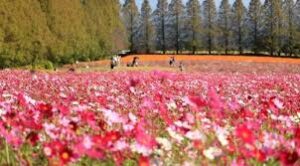
Flowers, with their vibrant colors, delicate fragrances, and ecological significance, play a crucial role in creating safe and sustainable living environments for people worldwide. Beyond their aesthetic appeal, flowers contribute to environmental stability, biodiversity conservation, and human well-being. Let’s explore the importance of flowers in fostering safe and sustainable habitats for all inhabitants of our planet:
**1. Environmental Health and Air Quality:**
Flowers play a vital role in purifying the air by absorbing pollutants and releasing oxygen through photosynthesis. Their foliage and blooms act as natural air filters, trapping dust, pollutants, and harmful gases, thus improving air quality and reducing the risk of respiratory ailments. Planting flowers in urban areas and green spaces helps mitigate air pollution and create healthier environments for communities to thrive.
**2. Pollinator Habitat and Biodiversity Conservation:**
Flowers serve as essential food sources for pollinators such as bees, butterflies, and birds, facilitating the pollination of crops and wild plants. By supporting pollinator populations, flowers contribute to ecosystem resilience, crop productivity, and genetic diversity. Maintaining diverse flower habitats, including wildflower meadows, hedgerows, and urban gardens, is crucial for preserving pollinator biodiversity and safeguarding global food security.
**3. Mental Health and Well-being:**
The presence of flowers in natural and built environments has been linked to numerous mental health benefits, including stress reduction, mood enhancement, and psychological restoration. Experiencing the beauty and tranquility of floral landscapes promotes relaxation, positive emotions, and overall well-being. Incorporating flowers into urban design, healthcare facilities, and public spaces creates therapeutic environments that promote mental health and social cohesion.
**4. Food Security and Nutrition:**
Many edible flowers contribute to global food security and nutrition by providing nutritious nectar, pollen, and edible parts for human consumption. Cultivating edible flowers, such as roses, lavender, and nasturtiums, enhances culinary diversity, flavor profiles, and nutrient intake. Integrating edible flowers into agricultural systems, community gardens, and urban farming initiatives promotes sustainable food production and supports local economies.
**5. Cultural Heritage and Connection to Nature:**
Flowers hold profound cultural significance across diverse societies, symbolizing love, beauty, remembrance, and spirituality. They feature prominently in rituals, celebrations, and traditions, forging connections between people and the natural world. Preserving floral diversity and indigenous plant knowledge honors cultural heritage and strengthens community ties to the land, fostering a sense of belonging and environmental stewardship.
**6. Climate Resilience and Adaptation:**
Flowers contribute to climate resilience by enhancing ecosystem stability, soil fertility, and water retention. Their deep roots, foliage, and symbiotic relationships with microorganisms help sequester carbon, prevent soil erosion, and buffer against climate extremes. Integrating flowering plants into sustainable land management practices, such as agroforestry, permaculture, and green infrastructure, enhances ecosystem resilience and supports climate adaptation efforts.
**Conclusion:**
In conclusion, flowers are integral to the creation of safe, sustainable, and livable environments for people worldwide. By harnessing the ecological, cultural, and therapeutic benefits of flowers, we can cultivate harmonious habitats that promote environmental health, biodiversity conservation, and human well-being. Embracing the significance of flowers in our lives fosters a deeper connection to nature and inspires collective action to safeguard the planet for future generations.










